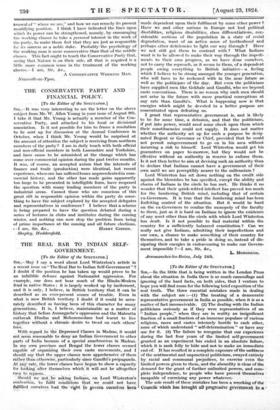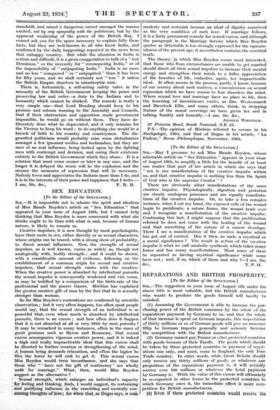[To the Editor of the SPECTATOR.] Sia,—In _the little _that
is being written in the London Press about the situation in India there is so much camouflage and ignoring of the hard facts, on both sides, that I venture to. hope you will find room for the following brief exposition of the real truth. The three essential mistakes made in dealing with the subject are :-(l) The treating- of a democratic representative government in India as possible, when it is as a matter of fact inconceivable. (2) The dealing with the Indian politicians seriously as if they were representatives of an " Indian people," when they are in reality an insignificant fraction of a small fraction of an immense populace of various religions, races and castes intensely hostile to each other, none of which understand " self-determination " or have any use for it. (3) The failure to recognize that our experience during the last four years of the limited self-government ' granted as an experiment has ended in an absolute failure, which it is rank folly to hide and- not to make an immediate end of. It has resulted in a complete exposure of the unfitness of the sentimental and impractical politicians, swayed entirely by_racial and communal prejudices, to exercise even the limited powers given to them, and the absurdity is clear of the demand for the grant of further unlimited powers, and com- plete independence, to people who -have proved -themselves
incapable of exercising any power whatever, _ The sole result of these mistakes has been a wrecking of the
Councils which has brought progressive government tuit - standstill, and raised•a dangerous Unrest amongst the masses excited, not by any sympathy with the politicians, but by the apparent weakening of the power of the British Raj. I cannot ask you for the space necessary to explain fully these facts, but they are well known to all who know India, and confirmed by the daily happenings reported in the news from that unhappy country. But while the situation in India is serious and difficult, it is a gross exaggeration to talk of a " lost Dominion," or the necessity for " reconquering India," or of the impossibility of " subjugating India." India is no more and no less " conquered " or " subjugated " than it has been for fifty years, and we shall certainly not " lose " it unless the British Empire dissolves in catastrophic ruin.
There is, fortunately, a self-acting safety valve in the necessity of the British Government keeping the peace and preserving law and order--a duty to the Indians and to humanity which cannot be shirked. The remedy is really a very simple one—that Lord Reading should keep to his promise and solemn warning to the Assembly and Councils, that if their obstruction and opposition made government impossible, he would go on without them. They have de- liberately done what he deprecated, and it only remains for the Viceroy to keep his word ; to do anything else would be a breach of faith to his country and countrymen. The dis- gruntled politicians would probably raise some disturbances amongst a few ignorant coolies and budmashes, but they are - men of no real influence, being looked upon by the fighting men with contempt and derision, and owing their existence entirely to the British Government which they abuse. It is a solution that must come sooner or later in any case, and the longer it is delayed the worse will be the explosion and the 'sterner the measures of repression that will be necessary. Nobody loves and appreciates the Indians more than I do, and it is in the interests of their peace and happiness that I write.—



































 Previous page
Previous page